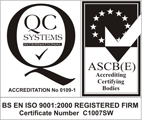Lower Billacott Farm, North Petherwin, Launceston PL15 8LT
Tel: +44 (0) 845 3700 266 Fax: +44 (0) 845 3700 277
Precision Balls
Aluminium and Duralumin Balls
| General Information: | |||
| Recommended for applications where light weight and resistance to certain types of corrosion are required. Aluminium and Duralumin balls have good thermal and electrical conductivity and are non-magnetic. | |||
| Basic Composition: | Aluminium Balls | Duralumin Balls | |
| Aluminium | 99.9% | 94 | |
| Copper | --- | 4% | |
| Manganese, Magnesium, Silicon | --- | approx. 0.5% each | |
| Mechanical Properties: | |||
| Hardness | --- | 90-145 Brinell | |
| Density | 0.097lbs/cub.in. approx | 0.101lbs/cub.in. | |
| Specific Gravity | 2.68/2.70 approx. | 2.74/2.79 approx. | |
| Size Range: | |||
| Imperial | 1/16" to 15/16" inclusive | ||
| Metric | 2mm to 25mm inclusive | ||
| Tolerances: | Aluminium Balls | Duralumin Balls | |
| Basic Dia.Tolerance | ±.004" ( ±.0.10mm) | ±.002" ( ±.0.05mm) | |
| Sphericity | .001" ( .0.025mm) | .0005" ( .0.013mm) | |
| Surface Finish | Semi-polished | Semi-polished | |
| Corrosion Resistance: | |||
| Generally resistant to acetic acid, acetone, carbonic acid, illuminating gas, petroleum products, steam etc. Definitely not recommended for most alkalies, chlorides and oxides. Contact with some other metals in the presence of an electrolyte can cause galvanic corrosion. | |||
